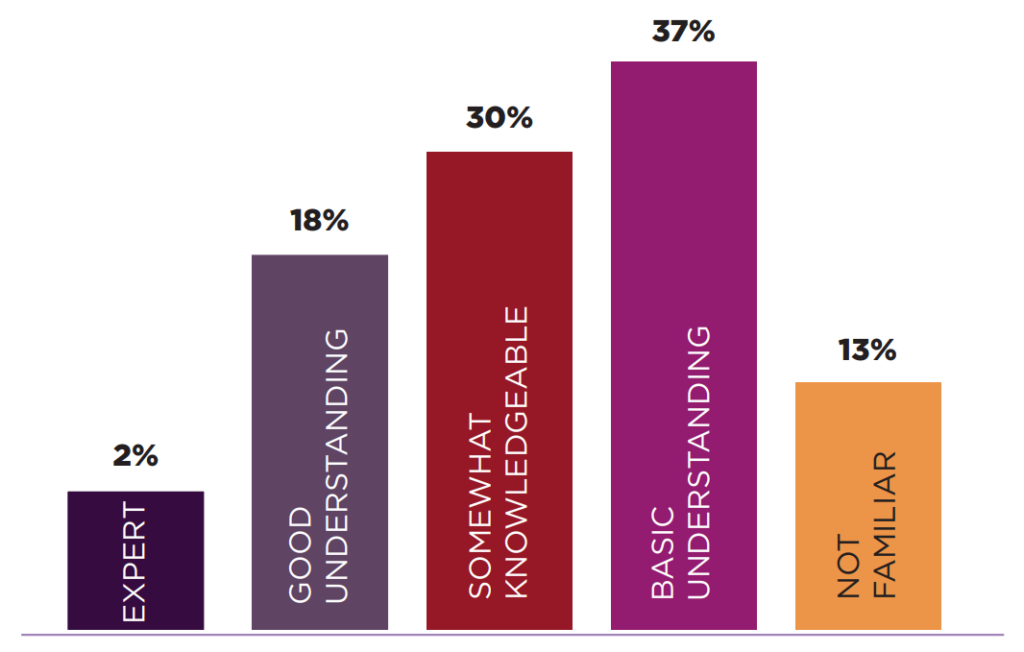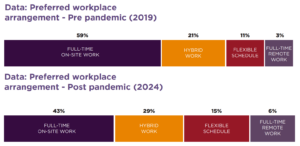Findings released today as part of Business Chamber Queensland’s 2024 Digital Future of Work Report highlight a third of Queensland businesses (31%) are struggling to keep pace with changing technologies, including Artificial Intelligence (AI).
The report, supported by Australian Retirement Trust, offers a behind-the-scenes view of how Queensland businesses are navigating emerging digital trends in the workplace, enabling business, industry and government to plan and invest for the future.
One such trend is the rapid growth of AI which has left some businesses struggling to understand what it means for them, while others are already reaping the benefits. Despite the ongoing conversation around AI, which suggests a workplace revolution is already underway, many businesses are hesitant to hand over the reins, citing security risks and a hesitancy to further increase technological complexity.
Only one in five businesses surveyed described themselves as having an ‘expert’ or ‘good’ understanding of AI and its potential implications for their business and 13% were not familiar with AI at all.

The business perspective
A small professional, scientific and technical services business in Moreton Bay said most of the time technology wastes more time than it saves and costs more than it returns.
“The great danger is the ‘shiny object syndrome’ where we have the very latest technology foisted upon us – often with little choice – and we might only use 10-15% of it,” they said.
Another small health and community services business on the Gold Coast said, “Some technology is good, but the direction it’s heading is taking over control from human beings and opening everyone up to hacking problems.”
Despite these concerns, one in three businesses indicated they want to learn more about AI and the opportunities it presents and 33% are already using AI in a basic way, when built into other programs.
‘Using AI involves risk, but there is greater risk in not using it’
Queensland small business owner and Founder of Social Mediology and the AI Success Lab, Kate vanderVoort teaches business professionals and teams how to incorporate AI into their operations to boost productivity and increase impact. Kate is at the forefront of using AI in her own businesses and is in huge demand to help others understand and exploit the tech transition.
Ms vanderVoort said the majority of businesses she’s worked with are at the early stages of AI adoption but have a keen appetite to implement AI across tasks, roles and departments.
“Businesses and workforces have been using AI unknowingly for years, but the difference is it’s now easily accessible for every business, and across every part of the business,” said Ms vanderVoort.
“Those who adopt it will leapfrog to the front of their business category and be able to do twice as much in half the time and really enhance the value of their workforce.
“AI isn’t coming, it’s already here. I say fasten your seatbelt, it’s going to be a wild ride.
“AI has a whole lot of business risk, but there is greater risk in not using it.”
Risks and opportunities in the digital future of work
Beyond AI, other key priorities identified were maintaining cyber security, improving internet connectivity, managing workplace arrangements and boosting workforce skills and credentials.
On the cyber security front, 15% of businesses reported experiencing a cyber attack in the past 12 months, of which 52% were small businesses. Despite the growing ‘threatscape’, fueled by the proliferation of new technologies and internet-connected devices, business’ average rating of level of preparedness for an attack was only 5.8 on a scale of one to 10.

While some businesses are battling cyber threats, others are struggling to simply stay online with poor internet connectivity impacting both metro and regional Queensland areas. More than one in five (22%) said they experienced poor internet connectivity very often and 7% reported always having poor connectivity.
Of those businesses who said they always or very often experienced poor internet connectivity, 24% primarily operate in Brisbane and 76% in regional Queensland. These findings indicate a clear need to prioritise fixing connectivity gaps, particularly in regional areas. Investment in high-speed internet and digital infrastructure across the state will serve to enhance opportunities and enable more Queenslanders to participate in the digital future of work.
When it comes to workplace arrangements, the rapid evolution during COVID-19 had marginal long-term impacts on business’ preferences. In 2024, 43% of businesses reported full-time, on-site work as their preferred model, compared to 59% pre-pandemic.

While there were marginal changes to where and how people work, businesses are expecting big changes to how they upskill as technology begins to reshape roles and tasks.
To keep pace with this shift, the majority of businesses are embracing micro-credentialling and other informal training methods, rather than relying on traditional education. Close to one third (31%) reported a strong or critical need to recognise micro-credentials or informal training, demonstrating a preference for in-house learning and development to evolve and retain current employees.
An action plan for Queensland’s digital future of work
The 2024 Digital Future of Work survey captured the unique challenges Queensland businesses face in preparing for and adapting to advancements in technology. The findings provide critical insight for businesses, industry and government to plan for, invest in and embrace the digital future.
Following the release of the report, Business Chamber Queensland will continue to lead the discussion on the future of work for business in Queensland and advocate for all levels of government to enable businesses to thrive.
About Australian Retirement Trust
Australian Retirement Trust is one of Australia’s largest super funds. Close to 2.4 million Australians trust us to take care of over $300 billion of their retirement savings. We’re here to help our members retire well with confidence, focused on strong long-term investment returns, lower fees and the information and access to advice our members need to manage their super and retirement.







